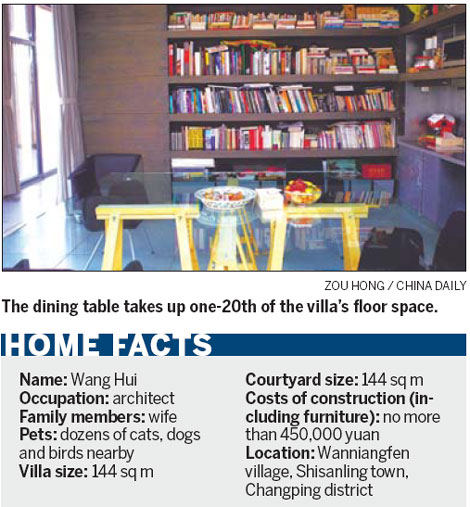
|
Clockwise from left: Wang Hui lies leisurely among cushions in the sunny living room; the relaxing bedroom; local stones are used for the courtyard; his home looks like a box from the outside. [Photo/China Daily] |
Architect Wang Hui has designed his villa so he can be constantly close to nature, Liu Yujie reports.
These days with 400,000 yuan, what kind of house in Beijing can you imagine yourself living in? At most it will be a toilet-sized apartment. However, by simply moving to the countryside, with the same amount of money you can have a modern villa in the suburbs near the Ming Tombs that is immersed in a beautiful park with swans gliding across a lake. But to do that you have to appreciate the art of slow living like architect Wang Hui.
On seeing his villa for the first time, it's hard to believe your eyes.
The house is built with local materials by villagers, the stones and timber come from the nearby mountains, and in order to coexist with the century-old persimmon trees that were planted during the reign of Empress Dowager Cixi era (1861-1908) and which stand at intervals of 12 meters, Wang especially designed his studio and a courtyard on the west based on a 12-meter grid.
With only a few buildings in the large park, all half hidden amid trees, Wang uses whole blocks of transparent glass for the walls of the villa. Curtains were installed, but they are seldom used.
"You can just lie back and enjoy the natural scenery without worrying there will be someone out there peeping inside," Wang said.
The box-like studio is evenly divided into four spaces each taking a corner. Going counter-clockwise from the entrance, one goes through a sunny living room, a study dominated by an extraordinarily large desk, a bedroom with nothing but a double bed and a dining room with a large square table that is one-20th the size of the building.
Meanwhile, the Wang has cleverly nestled the rooms and storage areas not meant to be seen - like a toilet, shower room, wardrobes and bookshelves just inside the load-bearing cross walls that separate the box into the four different areas.
The structure is designed to be modular if there is the need for expansion. By removing one of the glass walls, additional rooms can be easily added. Wang said when his child is born he may expand eastwards to add another room.
"My principle is that only necessities are placed in my house," Wang said. That's why you don't see a TV, or any decorative pictures in his home.
However, that is not to say that Wang does not have any decorative elements. He has created a unique decoration that is free and environmentally friendly.
He gathers feathers dropped by the white swans, black swans and a kind of blue parrot in the park, and aligns them along the seams of the wood planks behind the sofa. What an amazing piece of art the feathers make in his imaginative hands.
Wang loves and lives with animals. Wild cats frequent his home to have meals and sometimes stay overnight. Dogs raised by locals also love dropping by to say hello and, if needed, accompany Wang on one of his leisurely walks around the park. Birds like to pay to Wang a visit too as he always leaves some food for them on the small hill in front of his home.
There are also two pelicans from Beijing Zoo living in the park under the care of local professional feeders.
Wang has made the building as "green" as possible by using sunlight for warmth in winter and by attaching movable wooden shutters outside the glass walls to keep out the strong sunlight in summer.
The heating is provided by a hot spring, so that even in winter windows and doors can be left open to let in more fresh air. Wang said he likes the overall temperature indoors a little cooler than comfortable, as it keeps him awake.
In fact, when at home, he and his wife, a playwright, spend more time sitting outside by the long wood table in the courtyard than in the kitchen or living room because they both favor "a more intimate relationship with nature". Electricity sockets were added to the table during construction, which allows them to use their laptops outside, hold barbecues and eat hot pots with friends under a big umbrella.
The nature lover also has a small round pool that is a hot spring bath outdoors.
"It is a gift from nature. If you dig deep enough in this area, there will be a warm spring gushing out from the underground. The water temperature can reach as high as 67 C."
Mountain ranges surround the park on the west. "It takes about 40 minutes to 1 hour to stride over the seven little peaks on that mountain," Wang said, pointing to the mountain that stretches its way east-west several hundred meters south of his villa.
"The mountains are so close that you can even see climbers' silhouettes moving along the ridges against the sun. Sometimes I go for a climb, other times I sit on the floor in my living room and watch my friends climbing far away as the sun sets."
He said whenever he has disputes with his partners over a certain design scheme, he takes them to the park for a walk.
"When a conversation is too difficult to continue, you can just distract people's attention by pointing to something that happens to catch your eye," Wang said, laughing.
"It really helps to ease the tension. That's how nature works on the mind. When you are inside, you cannot just ride off the discussion by saying 'Hey, that ballpoint pen looks so fun'."
